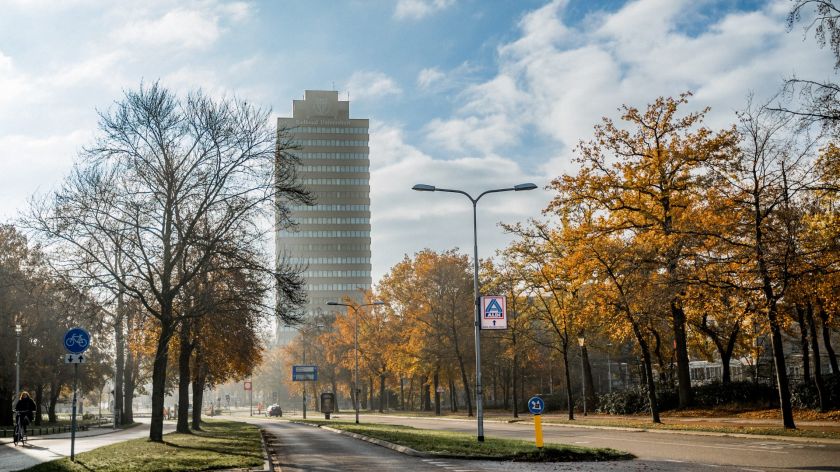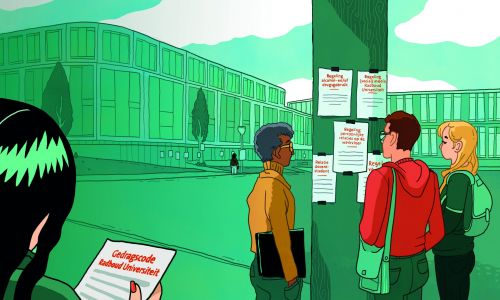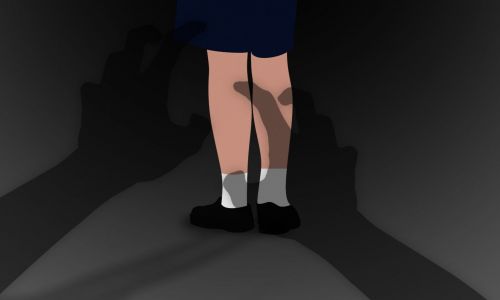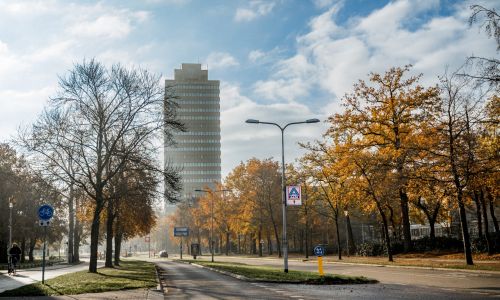‘Social safety should become a fixed part of leadership trainings’
-
 The Erasmus building. Photo: Johannes Fiebig
The Erasmus building. Photo: Johannes Fiebig
Radboud University can still do more when it comes to social safety. This was said by two members of the Radboud Young Academy in an interview regarding philosopher Fleur Jongepier’s departure. ‘As a university, you should propagate that this is an important topic and that you’re working on it much more often.’
For members of the Radboud Young Academy, Fleur Jongepier’s departure from Radboud University last week did not come as a surprise. In a long message on Twitter, she announced that she had left the university because of transgressive behaviour by (former) colleagues and the way the university handled this. In addition to being a scientist, Jongepier was the founder and co-chair of the Radboud Young Academy (RJA), an advisory body for young scientists at the Nijmegen university.
Driving role
‘Of course we are very disappointed by Fleur’s departure’, says Eelke Spaak, current co-chair of the RJA and assistant professor in artificial intelligence and cognitive neurosciences. ‘Fleur has meant a lot for the start, the regulations, and the identity of the RJA. I do get the idea that she has taken a positive stance, she is happy she has left before she experienced a burnout. Even without the RJA and university, she will accomplish many great things in life.’
‘Fleur actively wanting to improve the university, has given the RJA a boost’, Renée Wagenvoorde adds. She is a member of the work group for social safety, diversity, and inclusion within the RJA. She also works as a student advisor at the Faculty of Philosophy, Theology, and Religious Studies. ‘The RJA consists of many diverse personalities. Fleur is someone who had a driving role, which was great for the RJA. We are surely going to miss her.’
Can you understand the reasons for Jongepier’s departure?
Wagenvoorde: ‘Fleur’s departure had to do with many cases spread among different universities. That has probably all piled up. I understand why she came to this conclusion.’
‘The university could do more about this than has happened thus far’
‘In our work group, we have talked about the academic climate around social safety. We mainly looked prevention: how would you like the university to deal with hierarchy, mutual relationships between employees, and relationships between employees and students? As a university, you should do more about all this than has happened thus far. There might be some movement, but the university is a large and cumbersome institution.’
How is social safety at Radboud University doing? Are there more problems in this area than elsewhere?
Spaak: ‘That would be speculation. To a greater or lesser extent, these types of problems also play a role at other universities. It is great that there is now a social movement, that the topic of social safety is talked about publicly more often. Larger institutions can now take measures to improve this. Also at Radboud University.’
Wagenvoorde: ‘Every organisation dealing hierarchy and status encounters these types of problems. A university has extra risk factors such as a power struggle between and within different areas of expertise, or the fact that employees as well as students are passionate about their area of expertise and have intensive contact with each other about this.’
As a university, how can you prevent more talented young scientists from leaving because of the reasons given by Jongepier?
Spaak: ‘Broad awareness among employees is essential. Quite a lot of training courses are offered in this area, but they usually attract the people who need it the least, who are already concerned with social safety anyway. It would be good if a short training course became part of the UTQ (University Teaching Qualification, ed.). That way, even if it is only half a day, everyone can learn about possible risk factors – think, for example, of intensive 1-on-1 contact between lecturers and students, where you have to be aware that feelings can arise.’
Wagenvoorde: ‘Social safety should also become a fixed part of leadership training. Not only the contact between lecturers and students, but also how colleagues treat each other. That’s also where strife, power and intimidation are. The non-binding nature of this kind of training needs to go. If you have a leadership position at a university, you have to be aware of these things. That includes knowing how to deal with it and when and how to intervene.’
Have you already raised this with the Executive Board?
Wagenvoorde: ‘We have taken stock of what the university is doing at the moment, for instance the attention paid to this during lecturer and leadership trainings. The latter happens very little, which did not make me happy in the slightest. I know that the Faculty of Philosophy, Theology and Religious Studies now has an action plan for the ‘Healthy Academic Climate’ programme, of which social safety is an important part. Within this programme, teacher ethics is on the agenda. Other faculties are also now working on it.’
Spaak: ‘A while ago, an Amnesty International manifesto, Let’s talk about Yes, was published. This manifesto deals specifically with sexual safety and sexual violence at higher education institutions. A number of universities and colleges have already signed it. We then asked the Executive Board whether Radboud University would also like to sign it. Board chair Daniël Wigboldus then explained to us that the university did endorse the principles of the manifesto. Yet he did not want to sign the manifesto on behalf of Radboud University, because participants would have to commit to very specific training courses, among other things. I could understand that in this particular case.’
‘Too little attention is being paid to social safety in lecturer and leadership training programmes’
Wagenvoorde: ‘But if you embrace a campaign like this, you also show your staff that you take this seriously. Now all kinds of things are probably being done, but it is also invisible. That’s a shame. As a university, you should propagate that this is an important topic and that you’re working on it much more often.’
Spaak: ‘At the Faculty of Social Sciences, where I work, an investigation concerning undesirable behaviour is currently underway. In its wake, the faculty has hung notes on the inside of toilets saying that victims of sexual violence can contact a confidential counsellor. The way it was written could be better, but such initiatives are certainly valuable.’
Do you think the university and faculty have properly handled the situation currently going on within the Faculty of Philosophy, Theology and Religious Studies surrounding Paul Bakker?
Spaak: ‘That is a sensitive question. It is made almost impossible for us and others to say anything about that, because we don’t know what happened.’
‘That the matter within the Faculty of Philosophy, Theology and Religious Studies has been going on for so long is not good for anyone’
Wagenvoorde: ‘We have no idea what exactly is going on, but the fact that it has been going on for so long is not good for anyone. Not for the reporters, not for Paul Bakker – regardless of whether you have to defend someone who has acted inappropriately – not for the staff and students of the faculty, nor for Radboud University. We cannot judge whether it could have been done differently. But if it could have been done differently, it should have been done differently.’
ABC of Care
Just this week, the Radboud Young Academy presented the ABC of Care. ‘That is an alphabet that aims to draw attention to the various things you can pay attention to in your work as an academic around ‘care’ in a broad sense, which certainly includes social safety,’ says co-chair Eelke Spaak. ‘For example, the R stands for Respect. We hope it can help you be more pleasant in your daily life as a scholar.’
Translated by Jan Scholten



